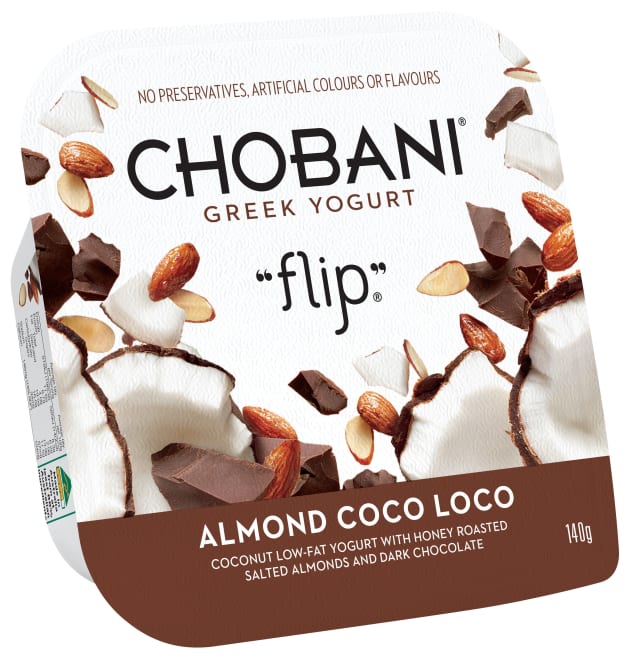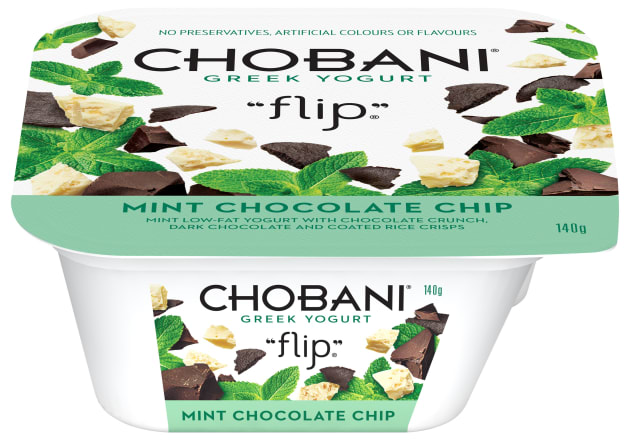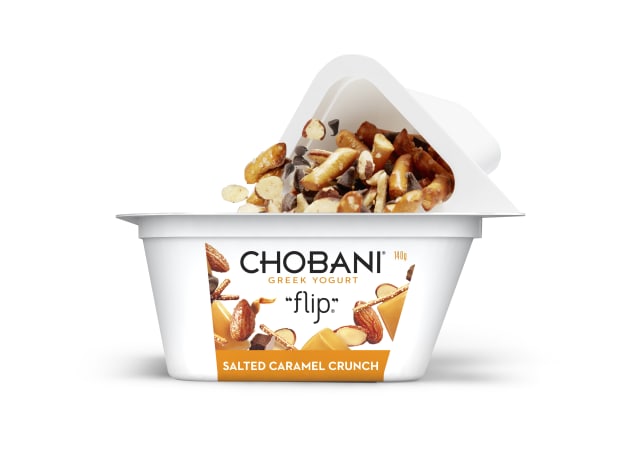This week Chobani Australia brings innovation to the dairy aisle with its Flip range that's already made it big in the US. PKN looks at the unconventional IML process used in the Australian pack's design.
Chobani Flip is the name of the new yoghurt snack range that comes in a dual compartment container, with Chobani Greek Yogurt on one side, and dry mix-in ingredients in the other. The product takes its name from the 'flip' action made by the consumer in order to mix the two.
According to John Williams, NPD Manager at Chobani, Flip is the biggest launch to hit the yoghurt category since Chobani launched in Australia.
“We are launching 10 flavours on 31 July, an unprecedented number in this category,” he said.
But more than introducing product innovation, in the Australian market, Chobani Flip has explored new territory with its packaging, designed and produced by South Australian company PakPot.
Chobani Australia worked with plastics moulding specialist PakPot from the outset of the project, Williams tells PKN.
“We chose to partner with PakPot as we knew their expertise in IML from working with them on our Meze Dip and Foodservice yogurt range,” he says.
Chobani specified in-mould labelling (IML) in order to maximise the printable area of the tub, Williams explains.
“In doing so we were able to move the barcode and mandatory copy to the base and rear of the tub, freeing up the two sell faces (tub front and lid) for the imagery, colour blocking and branding,” he says.

“Pakpot were fast and responsive to changes we requested – they were able to modify drawings and provide 3D mock-ups within a few days.
“This allowed us to test and validate various chamber volumes in order to find the best fit for our dry ingredients.”
PACKAGING FIRST TO MARKET
Joe Matto, GM of PakPot Packaging, explains that the project started with a review of the Chobani US thermally processed tub, and evolved into designing a twin chambered package with live hinge that utilised the injection moulding process in conjunction with the IML process.
“The 18-month process involved developing multiple product designs until we were all satisfied and then progressing into prototype tooling to confirm the design concept, including application of the IML, before progressing to manufacture production tooling and automation,” Matto says.
“From the research we undertook, we believe this Flip design to be one of a kind,” Matto says.
Why? Because it's a twin injected polypropylene tub with a live hinge utilising IML Y labelling process by injection through the label.
“We know there are similar twin chambered products on the European markets with IML, however, these labels/IML use the wrapping process – we have created a Y IML label enabling the base of the tub to be utilised for compliance and opening up the sides of the pack for marketing and branding.”
“The Y IML process is much more challenging than wrapping process under these conditions when injecting through the label,” Matto adds.

Along the 18 month time-line from concept to finished project, Matto reports that there were no major challenges encountered.
“We invested the time and R&D, including testing in our supply chain, to ensure the process was proven. We also invested in the tooling-moulds, IML automation and plastic injection machinery to create the IML flip cell,” he says.
“It was a pleasure working with Chobani NPD team to create such a unique and modern pack which I’m sure consumers will love,” Matto adds.
Chobani Flip range has launched in all major leading supermarkets and food retailers. The RRP is $2.99 and it comes in the following flavours:

Almond Coco Loco
Key Lime Crumble
Salted Caramel Crunch
Peanut Caramel Satisfaction
Chocolate Haze Craze
Peanut Butter Dream
Nutty for ‘Nana’
Mint Chocolate Chip
Apple Crisp Twist
Strawberry Shortcake








